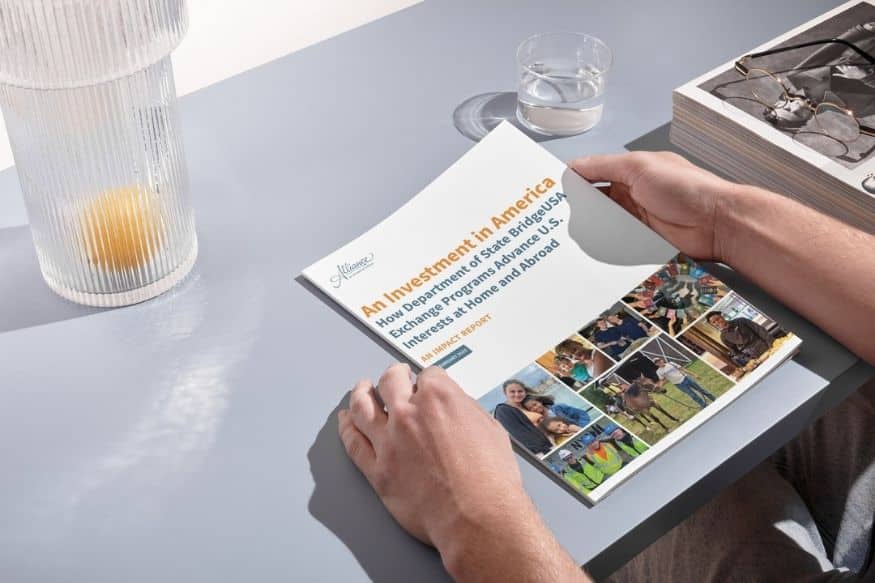
Image courtesy of Rachel M.
As we roll into a new year and a new Congress gets underway, interesting issues are cropping up and pesky old challenges won’t go away. These are the international exchange issues and trends I’m keeping an eye on in 2019.
A new name for the Exchange Visitor Program
Move away from the term “J-1.” That was the State Department’s message last May when announcing a rebranding initiative for the Exchange Visitor Program (EVP):
“Because [Exchange Visitor Programs] utilize the J-1 visa, they have often been referred to as ‘J-1 programs.’ However, we would like to start moving away from this terminology, since it trivializes the importance of these programs by reducing them to the name of a visa category.”
I couldn’t agree more. Since then, the Bureau of Educational and Cultural Affairs (ECA) has embarked on a comprehensive rebranding process that will result in, we hear, a new name for the EVP this year. I’m excited for the unveiling.
Threats to the EVP linger
In 2017, the Trump administration threatened to cut five Exchange Visitor Programs (Au Pair, Camp, Intern, Summer Work Travel, and Trainee). I’m happy to report again that the programs have not changed and are operating full steam ahead. Much of the credit for this goes to the exchange community’s impressive advocacy activity over the past year and a half. It’s had major impact.
But immigration certainly isn’t receding as an issue. There’s the ever-present danger that the EVP could get swept into the broader immigration morass. And despite a current relatively quiet period, the new year has brought a bit of renewed criticism of the EVP. My “we’re never in the clear” attitude remains.
So I think I’m destined to write this same line every January from here until the end of time: Broad and forceful advocacy in support of the EVP remains as much of a priority this year as it was last year.
Calling all new Congressional champions
While 86% of active EVP supporters returned to Congress, we lost several key champions. So who will step up?
Sen. Mitt Romney (UT), given his previous support of exchanges and spot on the Senate Foreign Relations Committee? Sen. Marsha Blackburn (TN), to take over the Tennessee international exchange mantle from former senator Bob Corker? Reps. Jeff Van Drew (NJ) and Elaine Luria (VA), given that their districts are among the strongest Summer Work Travel hosting communities?
We’ll be watching closely (and visiting Hill offices regularly).
Waiting for the Summer Work Travel reg to drop
Released for public comment in January 2017, an updated SWT regulation has been languishing ever since. The Administration’s target release date of the new rule has slipped from February 2018 to June 2018 to December 2018. Another official announcement of delay is likely to come soon.
We support these updates to the regulation. A regulatory process can be a good thing, as it gives us an opportunity to look hard at the current state of the program, and shift where needed in order to improve. But given our need to plan far in advance for upcoming program seasons, the uncertain regulatory release schedule is challenging. So we’re keeping a close eye on when the new SWT reg will drop, and what its final contents will be.
The international student rollercoaster
The nearly 1.1 million international students who studied in the U.S. in 2017 (according to IIE Open Doors data) represents a 1.5% increase from the previous year. Yet new enrollments of international students at American universities fell by 6.6%.
Some point to the social and political environment in the U.S. as causing this decrease in new enrollments. Others say it’s related to other factors, such as the rising cost of American higher education; safety concerns surrounding gun violence; the scale-back of government-funded study abroad programs in countries like Saudi Arabia; and stiffer competition for international students from countries like Canada and Australia.
Whatever the primary culprit, these factors are all playing a role, which makes it unlikely that international applications and enrollments are going to spike any time soon.
A new ECA-education agent relationship
Education agents are private organizations that help U.S. colleges and universities recruit international students. Until 2018, ECA had not publicly supported agents, recognizing only its own EducationUSA network.
EducationUSA supports more than 450 centers and 550 advisors around the world who advise international students on U.S. higher education options. ECA has long viewed EducationUSA as a “nonpartisan” arbiter of information on all U.S. colleges and universities, while agents, because they recruit only for the schools that hired them, prevent students from seeing the wider, unbiased U.S. university picture.
The problem is that the sheer scale of U.S higher education makes it impossible for EducationUSA to provide information on all available options. Many schools – often smaller, lesser known ones – often don’t make it into the conversation when a student visits an EducationUSA center. Thus, many of those schools find it necessary to hire education agents to make themselves known to students abroad.
The simple reality is: there’s room for both. Agents and EducationUSA shouldn’t see each other as competitors but rather as partners working for the same goal. So ECA’s official recognition of agents is a welcome step, especially at a time of downward pressure on international student interest in the U.S. This new partnership might be something of an antidote to the international student recruitment challenges mentioned above.




